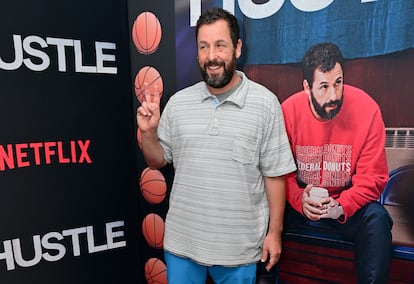Adam Sandler: from critical laughingstock to Oscar favorite
The sports drama ‘Hustle’ has put the comedian on the list of favorites for the next awards season. Despite the change in genre, his new film is not so far from the actor’s usual themes


In a scene from Hustle, the basketball drama that has become the most watched Netflix film worldwide since its June 3 premiere, the character played by Juancho Hernangómez rehearses his triple shot. In front of him, his scout-turned-coach, played by Adam Sandler, tries to distract him: “Your mother is a whore!” “Your sweat smells like piss!” The test is meant to make the young man overcome his weak point: his irascible response to his opponents’ insults, which on the court cause him to falter. “You got to be an iceberg out there, all floating around, and sharp, and taking down ships,” the coach says.
The actor knows what he is talking about. Since the beginning of his career, Adam Sandler has grown accustomed to receiving vitriolic critical reviews. Now, those critics witness Sandler securing one commercial success after another. His exclusive agreement with Netflix has earned him $420 million since 2015. The attacks continue, but Sandler is still there. Like an iceberg.
Hustle has not provoked the usual response. The film has received overwhelming acclaim from critics: Rotten Tomatoes gives it an approval rating of 92%, the highest ever for a Sandler film. Reviews have particularly praised the performance of its protagonist, and some already place him on the list of favorites for the next awards season. The New York comedian experienced this previously with Uncut Gems (2019), when he won, among others, the Best Actor award at the Independent Spirit Awards. He jokingly threatened to make a film that was “bad on purpose” if he didn’t also win the Oscar.

Sandler did not receive so much as an Oscar nomination for the role, but he has not kept his word. Journalists including Indiewire’s David Ehrlich have spoken of Hustle as a film far removed from the actor’s usual offering, with “more in common with ‘Jerry Maguire’ and ‘The Way Back’ than it does any of the other Happy Madison [Sandler’s company] productions.” Despite the change in register, Adam Sandler’s ardent fans will note the film’s commonalities with his comedies.
The plot centers on the process of managing emotions. That alone sets up Hustle as a counterpoint to the archetype behind Sandler’s early humor: the figure of the immature man who has violent outbursts when things go wrong. The relationship between Sandler’s and Hernangómez’s character recalls Sandler’s Happy Gilmore. In the 1996 film, a teacher played by Carl Weathers tries to teach young Sandler to manage his temper in order to help him become a golf champion.
“Criticism insists on separating them because it is a more serious, adult, apparently deeper approach. But that’s not the case,” says critic Roberto Alcover Oti, who coordinated the book Adam Sandler: La infancia infinita, a 2015 critical collection on Sandler’s work. “It is difficult not to see the adult player from The Longest Yard, the figure of the scout in Hustle,” says Alcover Oti, referring to the 2005 comedy in which Sandler played a football player in prison. “In his last stage, mainly as a result of the Grown Ups saga [2010-2013], Sandler has reflected, always humorously, on his late-adolescent heroes’ hard journey to maturity. And that is what Hustle is about.”
Against the “cynical assholes”
In the climactic trial of Big Daddy (1999), the boy adopted by Sandler’s character summarizes what he learned from the man: “he taught me that Styx was one of the greatest American rock bands, and they only got a bad rep because most critics are cynical assholes.” Sandler’s character then decides to prove his maturity by offering to be questioned by his biggest critic: his own father. The catharsis of the exchange drives the audience members to tearfully call their parents and reconcile. It is a scene definitely not suitable for “cynical assholes.”

The film encapsulates an essential element in its protagonist’s oeuvre: the outcasts’ victory over the system. The main character, a downright bum, is supported in court by a gang of outsiders, including a drunk, a beggar, an immigrant and several homosexual friends. And another frequent theme is that of family, also key in Hustle. In La infancia infinita, Alcover Oti highlights how Click (2006) leads to the understanding that “a narcissistic choice of existence can only lead to oblivion and loneliness,” while Grown Ups depicts the “lost paradise” of childhood as something that “can be enjoyed again through children.”
In the book, Oti also argues that Sandler’s celebrated dramatic characters, in films such as Punch-Drunk Love (2002) or Funny People (2009), can be “understood as dark, sorrowful, realistic versions of his usual figures.” In the former, directed by Paul Thomas Anderson, Sandler plays a perpetually nervous character who falls in love while struggling to make his way through a hostile world. Some have come to interpret it as an indie version of Superman, but Anderson, director of titles such as Magnolia and Licorice Pizza, has always maintained that he wanted to make “an Adam Sandler arthouse film.”
“There is just one Adam Saldner, who both sublimates his desire for success and cannot stop expressing the human side of it,” Roberto Alcover Oti tells ICON, referring to how the archetype varies in different films. In the book, he wonders whether the actor’s critical and public acceptance is due to his characters’ being self-destructives, rather than effortlessly achieving success. “Perhaps we feel closer to those fragile, loser archetypes, or perhaps we find it hard to project ourselves onto someone who turns their defects into virtues in order to succeed, since we don’t always achieve that,” he reflects.
In his acceptance speech for the Independent Spirit Award in 2020, Adam Sandler thanked critics for the effort to “pretend” not to hate him “for five minutes.” And he claimed independent film as “a big part” of his filmography, “from my first film, a fearless look into the American education system through the eyes of a privileged sociopath by the name of Billy fucking Madison to my searing exploration of American college football and its manipulation of socially-challenged athletes like Mister Bobby Bouchet [The Waterboy, 1998].” It remains to be seen whether Hustle will allow Sandler to collect new statuettes six months from now. For now, with the success of his Netflix movie, these are unfortunate times for those who can’t stand to see Sandler succeed.
Tu suscripción se está usando en otro dispositivo
¿Quieres añadir otro usuario a tu suscripción?
Si continúas leyendo en este dispositivo, no se podrá leer en el otro.
FlechaTu suscripción se está usando en otro dispositivo y solo puedes acceder a EL PAÍS desde un dispositivo a la vez.
Si quieres compartir tu cuenta, cambia tu suscripción a la modalidad Premium, así podrás añadir otro usuario. Cada uno accederá con su propia cuenta de email, lo que os permitirá personalizar vuestra experiencia en EL PAÍS.
¿Tienes una suscripción de empresa? Accede aquí para contratar más cuentas.
En el caso de no saber quién está usando tu cuenta, te recomendamos cambiar tu contraseña aquí.
Si decides continuar compartiendo tu cuenta, este mensaje se mostrará en tu dispositivo y en el de la otra persona que está usando tu cuenta de forma indefinida, afectando a tu experiencia de lectura. Puedes consultar aquí los términos y condiciones de la suscripción digital.








































